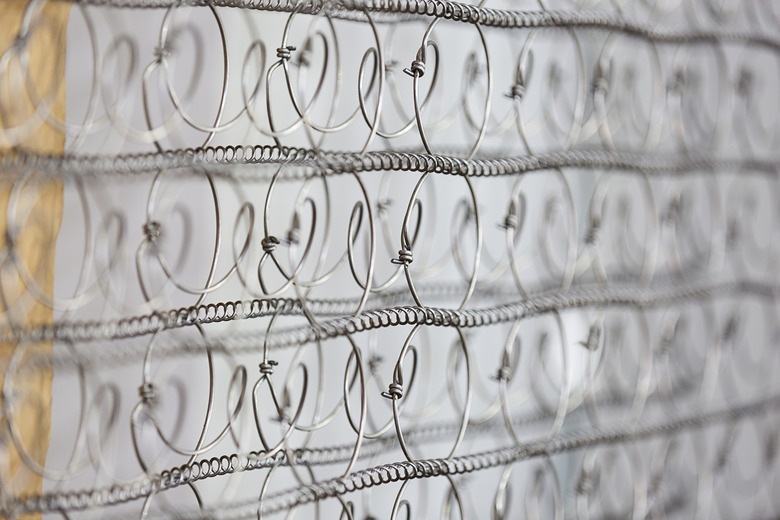How To Choose A Mattress
Taking your time before purchasing a mattress is well worth the effort; after all, you spend approximately one-third of your life in bed. Before making an impulse buy just because a mattress is on sale, consider all the things you seek in a good mattress, just as you would when looking for a new car or home. Once you've figured out the mattress factors most likely to ensure quality sleep every night, compare prices and options available from several retailers to make the best purchase possible.
Considering Costs and Warranties
Considering Costs and Warranties
A quality mattress can be quite expensive, but the most expensive option isn't necessarily the best for you. Likewise, any mattress that's consistently cheaper than the rest might indeed be of cheap, poor quality. Compare options in the middle price range to get a feel for how much you'll need to spend once you've researched mattress options.
Due to their low overhead costs, online mattress companies tend to offer significantly lower prices than brick-and-mortar shops. The downside: You won't be able to test the mattresses before purchase. Make sure to read the warranty and return policies thoroughly before purchasing online or in a shop. Most mattress retailers offer some form of tryout period. Some online retailers offer free shipping and accept returns with no questions asked; often, they donate mattresses instead of reselling them.
Warranties offered by traditional mattress companies can be quite strict, requiring that the mattress tag is still intact, or that the mattress isn't stained in any way. Read the warranty terms before buying a mattress if you're concerned that repair or replacement may be an issue once you own the mattress.
Comfort is Key
Comfort is Key
Ultimately, choosing a mattress that feels comfortable for your sleep style is the most important decision; after all, quality sleep is a must if you want to feel your best during your waking hours. Before deciding what mattress materials you prefer, test a few basic mattresses out in a store to determine what firmness level is best for you. Also try several brands, as "firm" and "soft" are relative terms and not necessarily the same from one brand to the next, even if the brands use a numbered scale of hardness.
If you like a soft mattress or one that cushions you to ease aches and pains, memory foam may be a good choice. If you sleep on your stomach, however, memory foam isn't a good idea, as it may feel somewhat suffocating as you try to shift into other positions. Memory foam and some other synthetic mattresses may also off-gas—emit hazardous chemicals into the air when new. These mattresses require an airing-out period of several days before use. If concerned about chemicals, choose a natural latex mattress or another option listed as having no volatile organic compounds, also known as VOCs. Even natural latex may require an airing out period to get rid of its initial odor.
Latex mattresses tend to be more bouncy than memory foam. If you share the bed with a partner that moves around a lot while you sleep, memory foam is the way to go, as it doesn't transfer motion. If you sleep alone or don't care for the way your body sinks into memory foam, latex is an excellent choice, as it conforms to your body a little, but not to the same degree as memory foam. It's also easier to shift positions on latex, as latex reverts to its original shape far faster than memory foam. Latex is also quite heavy compared to other mattress types, so keep that in mind if you need to haul the mattress up several flights of stairs.
If you share the bed with a partner who prefers a soft bed while you prefer firm, opt for an air bed that allows each user to adjust one side of the bed's firmness. Some of these also have different firmness zones on each side of the bed so you can adjust it for the best lumbar support while sleeping on your side, for instance.
Mattress Longevity Matters
Mattress Longevity Matters
Unless you plan to shell out money for another new mattress in a few years, opt for a mattress designed last a lot longer. While you can't really predict when that behemoth will start to sag in the middle, making a wise choice based on mattress type can ensure years of quality rest. The average mattress lifespan is around seven years.
- Quality innerspring mattresses may last longer if rotated and flipped each season.
- Latex mattresses usually last a little longer than coil-based beds and often carry extensive warranties spanning 10 to 30 years, thanks to replaceable layers within the mattress. Latex tends to cost more than innerspring or memory foam mattresses, but the longevity may make the extra cost worthwhile.
- Pillow-top mattresses tend to sag within a few years, but some models have replaceable layers that may be covered by warranty. Neither pillow-top nor memory foam mattresses can be flipped, which can lead to premature aging of the mattress if you sleep on it in the same spot every night.
To get the most value for your money, look for a mattress with an excellent warranty and that has modular, replaceable layers. The cost of replacing a layer or two should be far less than buying a new mattress.
Keeping Cool in Bed
Keeping Cool in Bed
For some people, comfort is a matter of being at just the right temperature while sleeping. If you tend to feel too hot in bed or if you don't sleep well when hot, you may want to avoid memory foam and pillow top mattresses.
- Memory foam, which conforms to your body's shape when body heat warms it up, also tends to retain some of that heat, making the bed feel a bit too warm for some. Memory foam is generally warmer than latex foam.
- Pillow-top mattresses also contain extra fillers, often memory foam, which also retains body heat.
- Hybrid mattresses with memory-foam comfort layers also retain heat. Latex foam comfort levels are usually somewhat cooler.
- A basic innerspring mattress cools and dries itself thanks to the air voids within the coils. This is a good choice if you prefer to sleep cool.
- Latex mattresses tend to sleep hotter than innerspring mattresses, although some types are designed to circulate air to reduce this tendency.
When it comes to any type of foam mattresses, the denser the foam, the greater the potential to retain heat since it's harder for air to flow through. In a pinch, a cooling, gel-based topper can be added to a mattress, but it's more convenient to choose a mattress that stays relatively cool in the first place.
References
- Sleep Like the Dead: Latex Mattress Reviews and Ratings
- Sleep Like the Dead: The Truth About Pillow Top Mattresses
- Sleep Like the Dead: Mattresses and Sleeping Hot / Heat Retention
- Select a Bed: Adjustable Air Beds
- Tuck: Understanding Mattress Warranties
- Amerisleep: The Facts on Memory Foam Smell
- Sleep Advisor: Memory Foam Versus Latex Compared



